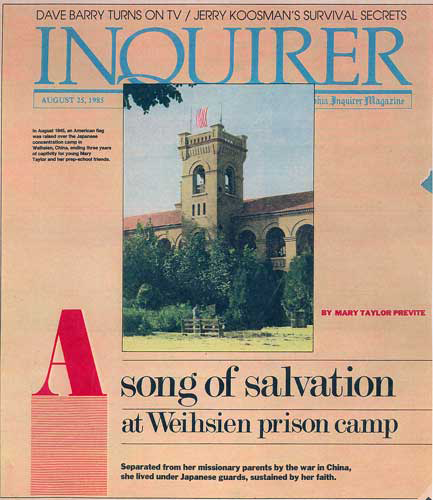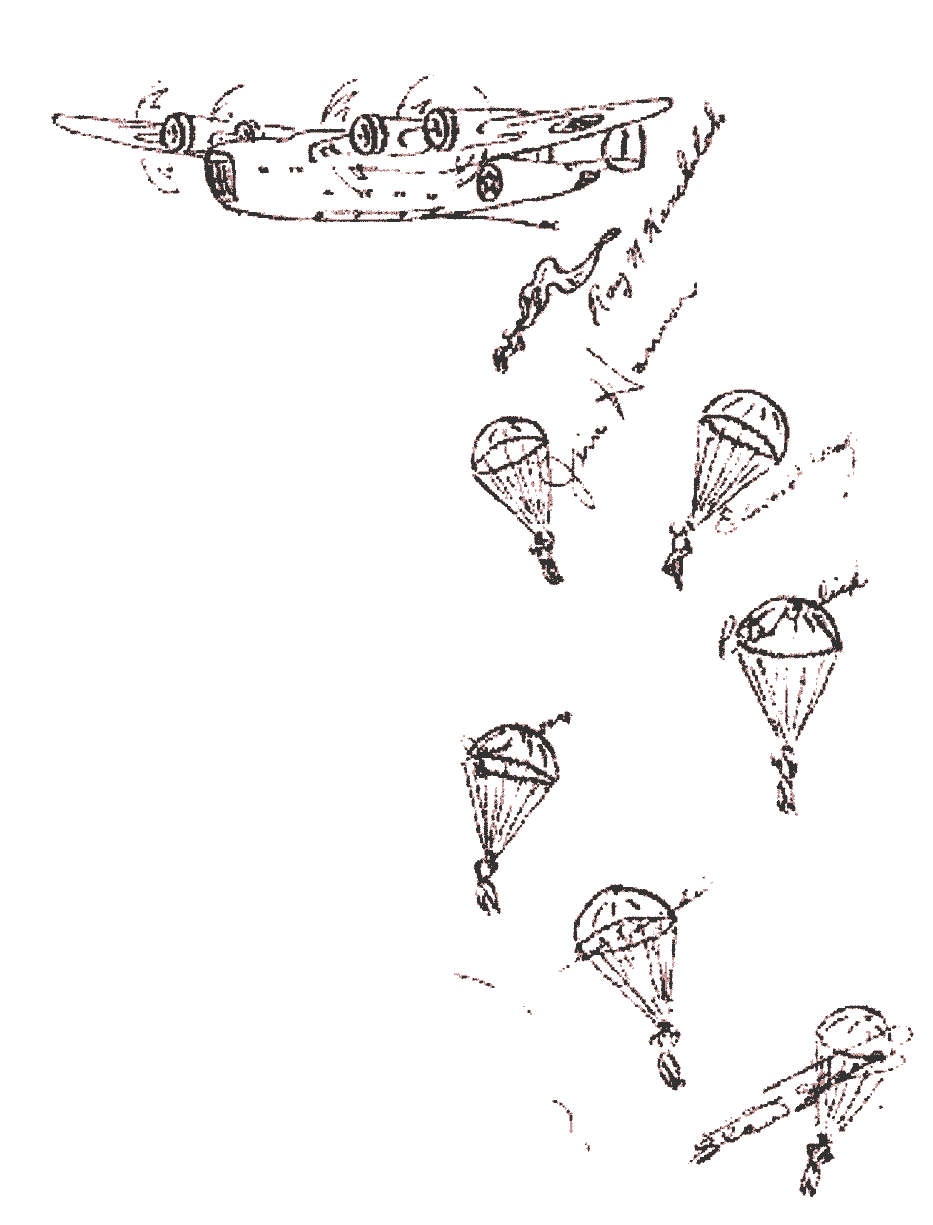
- by Mary Previte, née Taylor
[Excerpt] ...
[...]
 THEY WERE SPILLING from the guts of the low-flying plane, dangling from parachutes that looked like giant silk poppies, dropping into the fields outside the concentration camp.
THEY WERE SPILLING from the guts of the low-flying plane, dangling from parachutes that looked like giant silk poppies, dropping into the fields outside the concentration camp.
The Americans had come.
It was August 1945. “Weihsien Civilian Assembly Center,” the Japanese called our concentration camp in China.
I was 12 years old. For the past three years, my sister, two brothers and I had been captives of the Japanese. For 5½ years we had been separated from our parents by warring armies.
But now the Americans were spilling from the skies.
I raced for the forbidden gates, which were now awash with cheering, weeping, disbelieving prisoners, surging beyond those barrier walls into the open fields. Americans, British, men, women, children - dressed in proud patches and emaciated by hunger - we made a mad welcoming committee. Our Japanese guards put down their guns and let us go.
The war was over.
[excerpt]
IT WAS FRIDAY, AUG. 17, 1945.
A SCORCHING heat wave had forced the teachers to cancel classes, and I was withering with diarrhea, confined to my mattress atop three steamer trunks in the second-floor hospital dormitory.

Rumors were sweeping through the camp like wildfire. The prisoners were breathless with excitement - and some with terror. Although we knew nothing of the atomic bomb, the bamboo radio had brought the news two days ago that Japan had surrendered.
Was it true?
Mr. Izu, the Japanese commandant, was tightlipped, refusing to answer questions.
Lying on my mattress in mid-morning, I heard the drone of an airplane far above the camp. Racing to the window, I watched it sweep lower, slowly lower, and then circle again. It was a giant plane, and it was emblazoned with an American flag. Americans were waving at us from the windows of the plane!
Beyond the treetops, its silver belly opened, and I gaped in wonder as giant parachutes drifted slowly to the ground ...
Weihsien went mad.
 Oh, glorious cure for diarrhea! I raced for the entry gates and was swept off my feet by the pandemonium. Prisoners ran in circles and pounded the skies with their fists. They wept, cursed, hugged, danced. They cheered themselves hoarse. Wave after wave of prisoners swept me past the guards and into the fields beyond the camp.
Oh, glorious cure for diarrhea! I raced for the entry gates and was swept off my feet by the pandemonium. Prisoners ran in circles and pounded the skies with their fists. They wept, cursed, hugged, danced. They cheered themselves hoarse. Wave after wave of prisoners swept me past the guards and into the fields beyond the camp.
A mile away we found them - seven young American paratroopers - standing with their weapons ready, surrounded by fields of ripening broom corn.
Advancing toward them came a tidal wave of prisoners, intoxicated with joy. Free in the open fields. Ragtag, barefoot, hollow with hunger.
They hoisted the paratroopers’ leader onto their shoulders and carried him back toward the camp in triumph.
In the distance, from a mound near the camp gate, the music of “Happy Days Are Here Again” drifted out into the fields. It was the Salvation Army band blasting its joyful Victory Medley. When they got to “The Star Spangled Banner,” the crowd hushed.
0, say, does that star-spangled banner yet wave, o’er the Land of the Free and the Home of the Brave?
From up on his throne of shoulders, the young, sun-bronzed American major struggled down to a standing salute.
And up on the mound by the gate, one of the musicians in the band, a young American trombonist, crumpled to the ground and wept.
[further reading]http://www.weihsien-paintings.org/Mprevite/inquirer/MPrevite.htm
#








